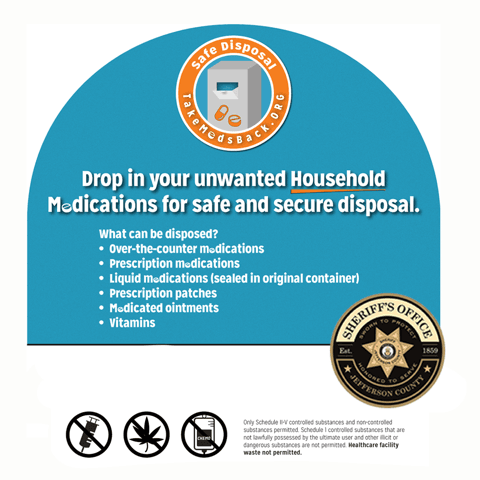Calendar
Twice a year the Jefferson County Sheriff’s Office joins law enforcement agencies nationwide to remove potentially dangerous controlled substances from our nation’s medicine cabinets. The Drug Take-Back Day provides an opportunity for the public to surrender expired, unwanted, or unused pharmaceutical controlled substances and other medications for destruction. These drugs are a potential source of supply for illegal use and an unacceptable risk to public health and safety. The DEA holds the National Drug Take-Back events in April and October of each year.
The next scheduled event is on Saturday, October 23, 2021, from 10 a.m. - 2 p.m.
The Sheriff’s Office will accommodate collections at three sites in the county:
Sheriff’s Office Headquarters
200 Jefferson County Parkway
Golden, CO 80401
Marshdale Elementary School
26663 N Turkey Creek Rd
Evergreen, CO 80439
(In the round-about)
Dakota Ridge High School
13399 W Coal Mine Avenue
Littleton, CO 80127
(In the west parking lot)
Facts About the Event
This one-day effort is intended to bring national focus to the issue of increasing pharmaceutical controlled substance abuse.
- The program is anonymous
- Prescription and over-the-counter solid dosage medications, (tablets and capsules) are accepted
- Intravenous solutions, injectables, needles, and oxygen containers will not be accepted
- Illicit substances such as marijuana or methamphetamine are not a part of this initiative
- The prescriptions should be removed from the original containers and placed in a plastic bag prior to dropping off
Medication Disposal Drop Boxes
The Jefferson County Sheriff’s Office has installed four safe disposal sites for residents to drop off unused or expired household medications. Secure medication drop boxes are now available at the following locations:
- Sheriff’s Office Lobby, 200 Jefferson County Parkway, Golden
- Jail Lobby, 200 Jefferson County Parkway, Golden
- South Precinct, 11139 Bradford Road, Littleton
- Mountain Precinct, 4990 County Highway 73, Evergreen
Drop boxes are the best option for families and individuals to safely dispose of potentially harmful medications. Prescription medications, over-the-counter medications, and vitamins can be disposed of in the dropbox. However, Sharps items, chemotherapy medication, and marijuana products may not be disposed of in drop boxes. Healthcare facility waste is also not permitted.
The average American household contains four pounds of prescription and over-the-counter medications. Sheriff Jeff Shrader explains “this excess of medications enables opportunities for misuse and abuse, which can have very serious consequences. If medication is taken incorrectly or by people it was not intended for, it could even lead to death.”
The Sheriff’s Office obtained its drop boxes through the Colorado Household Medication Take-Back Program, administered by the Colorado Department of Public Health & Environment. Medication collected in the boxes is securely packaged and shipped off-site, where it is converted to renewable energy.
What to do with items that cannot be accepted:
Household Needles/Sharps
Handle with Care! Skin punctures may transmit blood-borne infections.
Disposal Options:
Sharps Collection Programs can be found here.
Mail-in Sharps Containers (some pharmacies and websites sell sharps containers with mail-in labels, ensuring proper treatment and disposal. There is an added cost for this service).
Proper Trash Disposal
Never put a container of sharps in with recyclables. Sharps are not recyclable and not only can they pose an infection risk to workers at recycling facilities, but they can also render whole batches of recyclables unusable.
Used needles/sharps should never be placed loosely in the trash or flushed down the toilet.
Use a sharps container purchased from a pharmacy or other source, or use a strong plastic container (HDPE plastic with #2 recycling symbol) with a screw-top lid. Used laundry detergent bottles work well. Never use paper or plastic milk jugs. They can puncture. Never use glass containers. They can break and make the hazard worse.
- Containers of sharps should be clearly labeled as “Sharps” or "Biohazard Waste.”
- Once filled, the container should be firmly sealed (tape the lid) to prevent spillage.
- Store the sealed sharps container away from children and pets.
- Place the sealed sharps container in the trash on the day it gets picked up or taken to a landfill.
Chemotherapy Drugs
If you’ve undergone treatment with radioactive pharmaceuticals for a disease like thyroid cancer, some wastes you produce may be contaminated with residual radiation. Certain wastes may have to be temporarily stored before placing them out with your trash. You and your caregiver should closely follow instructions provided by your doctor about waste disposal.
The Comprehensive Cancer Center Pharmacy at Saint Joseph Hospital accepts chemotherapy drugs for disposal. Call (303) 318-3490 for more information.
Personal Care Products
Most personal care products can be disposed in the trash, but some local household hazardous waste programs may accept these products along with household cleaning products. Contact your local program directly, or contact your city/county government for program contact information.
Thermometers and Other Mercury-Containing Devices
Some local household hazardous waste programs will accept thermometers and other mercury-containing devices. Contact your local program directly, or contact your city/county government for program contact information.
All Colorado Ace Hardware stores and other Colorado businesses participate in a program to recycle mercury-containing thermostats. Visit Thermostat-Recycle.org for a complete list of locations.
Also, Holy Cross Energy and Alpine Bank have teamed up to accept compact fluorescent lights (CFLs) for recycling at several locations in the Vail, Glenwood Springs and Aspen areas. Ace Hardware stores will accept them as well.
Medical Tools and Supplies
Some charities will accept medical tools and supplies in good, usable condition. Project CURE is one such charity. Call (303) 792-0729 for more information.
Bloody or Infectious Waste
Soiled bandages, dressings and disposable sheets should be placed in securely fastened plastic bags before being placed in household trash. Trash containing these potentially infectious wastes should be stored out of the reach of children and pets until it can be picked up or taken to a landfill.
Marijuana
Unused marijuana and marijuana-infused products that were obtained by an individual for recreational or medical use may be disposed of by placing them in household trash or taken to a landfill. The marijuana must be rendered unrecognizable and mixed with other items of trash. Place in the trash on the day it gets picked up or taken to a landfill.
Illicit Drugs
Contact your local law enforcement agency for guidance.
Empty Containers
Empty containers should be recycled, if possible. Check the lists of acceptable recyclables provided by your curbside recycling service or local recycling program. Non-recyclable items should be placed in household trash or taken to a landfill. Strike personal information (i.e. patient name and prescription number) from prescription pill bottles before recycling or trashing them.










